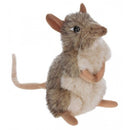Elephant shrews may in fact be one of the tiniest and cutest animals discovered in Africa. They are also known as jumping shrews. The elephant shrew has 19 species in total around Africa. They can survive in all kinds of habitats. These include places like plantations, plains, mountains, and deserts.
These small mammals are adorable. Here are some fun facts about elephant shrews:
ONLY ONE SPECIES OF ELEPHANT SHREW IS ENDANGERED
Among the 19 species of elephant shrew, the Golden Rumped elephant shrew is the only shrew that is an endangered species. It is the biggest among all the elephant shrews.
It is endangered because of fragmented forest environments. They live all over the Arabuko-Sokoke forest in Kenya. They are victims of traps in their living areas. Other animals do not like them as prey because of their bad taste.
ELEPHANT SHREWS ARE NOT RODENTS
Elephant shrews are compared to mice, but they are not rodents. They look like gerbils or mice because of their shape. They aren’t really shrews either, but are more similar to tenrecs and moles. The name “elephant” is because of their long flexible snout.
ELEPHANT SHREWS LIKE TO FEED ON BUGS
The elephant shrew feeds on smaller bugs like termites, beetles, ants, millipedes, earthworms, and spiders.
These small animals only feed during the daytime. They also maintain insect populations. They create a series of small paths to catch their prey. The elephant shrew has a sensitive sense of smell, sight, and hearing to detect both predators and food.
ELEPHANT SHREWS ARE FAITHFUL
Elephant shrews always travel around or live with partners. They are monogamous animals sticking to their own territory. They keep track of each other’s whereabouts through marking their scents.
YOUNG ELEPHANT SHREWS BECOME MORE VULNERABLE WHEN LEAVING THEIR PARENTS
In a single year, the elephant shrew can give birth around four to five times. When their babies are born, they are already covered in fur. They are usually kept hidden in the first three weeks and obey their mother for a period of one week. After they become more independent and weaned, the babies will remain in the parents’ territory for another six weeks before moving to their own territory.
ELEPHANT SHREWS ARE NOT FRIENDLY
Elephant shrews are tiny but fierce. They are intolerant of intruders and will viciously evict anyone who invades the sanctity of their peace. Destructive encounters will usually include sparring, shrieking, jerking and snapping. When this happens it can be a huge blur of animals fighting against each other on the forest floor.


